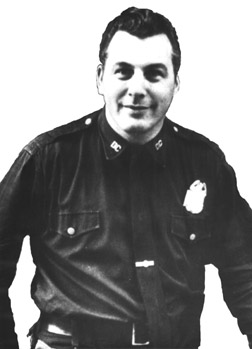|
convicted in the 1975 murder of one of our own; Correction Officer George Motchan.
Each day our officers and civilian staffers go forth to serve the public safety as did Officer Motchan that fateful September 9th 25 years ago. No less than they do today, he looked forward to returning home after his tour of duty. He never got that chance. Joseph James, a Brooklyn House of Detention inmate awaiting trial on robbery and murder charges, mortally wounded the unarmed officer during a precisely planned escape.
This letter is not the appropriate vehicle for a detailed recounting of all the secret arrangements James made with accomplices to have a gun hidden in a Kings County Hospital clinic bathroom and a car waiting with its motor running at the nearby exit, but the premeditated nature of that fatal shooting does need to be noted here.
James knew that the officer to whom he would be handcuffed during the clinic visit would, in accordance with security procedures, not be carrying a firearm. He also knew that the escort officer's partner, as the backup officer, would be armed. The inmate was aware that if the unarmed Motchan, with him in the bathroom, could be gunned down fast enough, the armed officer outside the bathroom might be surprised and shot before he had a chance to draw his service revolver. But Officer Motchan was able to get off a warning, seconds before the bullets ripped into him. James exited the bathroom into the crowded corridor firing his gun; wounding Motchan's partner and a female patient.
Officer Motchan died six days later in the hospital where he had been shot. Seventeen years with the Department, the 45-year-old had planned to retire in three years. He and his wife had just recently celebrated their 25th wedding anniversary and were looking forward to their new roles as grandparents. Granddaughter Eileen was then only seven months old. Officer Motchan missed out on watching her grow up and also missed out on seeing four other granddaughters born; another by his daughter and three by his son, whose dreams of a medical career he had encouraged. The father missed out on seeing his son succeed in becoming a doctor.
The memory of Officer Motchan is very much alive in this Department. The thousands of staffers who serve or have served in the Rikers Island jail named in his honor, the George Motchan Detention Center, are familiar with the bronze plaque mounted near its entrance paying tribute to this officer "who valiantly gave his life in the line of duty".
James was recaptured the day of the Motchan funeral. After his eventual conviction for the murder of a Correction Officer performing his duties, the inmate was sentenced to be executed under New York's then-applicable capital punishment statute. But a 4-to-3 decision of the State Court of Appeals voided the law's mandatory death sentence feature. Thus Correction Officer Motchan's premeditated murderer has, in effect, already received a parole - from death to life. He has already gotten more of a break than he deserved, and surely, more than he gave his victim.
We strongly oppose his bid for yet another break.
Sincerely,
BERNARD B. KERIK
| divider | On behalf of the 11,000 New York City Correction Officers represented by this organization, I'm writing this letter to respectfully request that you DO NOT grant a parole to Inmate Joseph James, who murdered New York City Correction Officer George Motchan in 1975.
Inmate James is scheduled to appear before the Board of Parole for a Parole Hearing next month. We strongly believe that rather than be released on parole, he should remain in jail for the murder of Correction Officer Motchan.
When he murdered our brother officer, Inmate James was already being held without bail in the Brooklyn House of Detention, awaiting trial for murder and robbery. He was alleged to have murdered Abraham Rudnick, a guard for a check-cashing service who was shot dead during a $10,000 robbery.
So that Inmate James' teeth could be cared for, Officer Motchan and his partner, Correction Officer Joseph Connors, escorted Inmate James to Kings County Hospital on September 9, 1975. During their visit to the hospital, Inmate James asked to be taken to the bathroom. Unfortunately, a conspirator had hidden a gun in the bathroom for Inmate James' use.
Inmate James used the gun to shoot Officer Motchan, who died a week later in the hospital. The inmate then charged into the waiting room, which was filled with patients, including mothers and small children. There he shot Officer Connors and a female patient. He then ran out of the hospital.
Officer Motchan, who died at age 45, was a well-liked officer and a beloved husband and father with two children. After his death, a major New York City jail was renamed the George Motchan Detention Center in his honor.
When recaptured and tried, Inmate James was found guilty of murder and sentenced to 25 years to life. We see absolutely no reason why a cold-blooded killer such as Mr. James should be released. He is now 52, a relatively young man, and should remain in jail for life.
Officer Motchan's widow, his family, his partner and, I'm certain, every New York City Correction Officer shares this view. Inmate James SHOULD NOT be granted parole.
Thank you for allowing me to express my views, and the views of New York City's Correction Officers, on this important matter.
Sincerely,
Norman Seabrook
President
|


